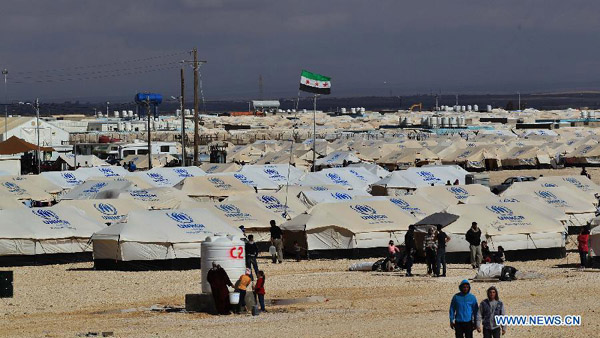UN says 60,000 killed in Syria conflict
 0 Comment(s)
0 Comment(s) Print
Print E-mail Xinhua, January 3, 2013
E-mail Xinhua, January 3, 2013
Violence intensified on Wednesday across war-torn Syria with reports of shelling in several areas and military showdown at a military airport in the north, as the United Nations put the death toll of the 22-month conflict at more than 60,000 people.
 |
|
Al Zaatri Syrian refugee camp is seen in the Jordanian city of Mafraq, near the border with Syria, on Nov. 12, 2012. [Xinhua/File photo]? |
Armed groups attacked early Wednesday the military airport of Taftanas in the northwestern province of Idlib, local al-Ekhbaria TV said, adding that government troops repulsed the attack and rendered many of the assailants killed or injured.
Arab news TV channels said the clashes at the airport were incessant, adding that the rebels managed to storm the airport.
However, a Syrian official source was quoted by the state-run SANA news agency as rejecting the reports as "unfounded." The unnamed official said such reports aim to lift the morale of the armed groups, adding that army units tasked with protecting the Taftanas airport have repulsed the armed groups' attack and dealt fatal blows to the assailants who have waged their attacks from several directions.
The airport has been a top priority for the rebels who are hoping for taking over it and paralyzing the power of the Syrian air force in the northern slice of Syria.
In the countryside of the Syrian capital Damascus, armed rebels attacked the military hospital of Harasta on Wednesday and clashes erupted with Syrian troops, reports said.
In another suburb of Damascus, Dahiet al-Assad, mortar shells fired allegedly by the rebels landed at a mosque in the pro- government suburb, causing material damage only, report said.
Clashes have also intensified in al-Yarmouk camp for Palestinian refugees in Damascus, with mortar shells slamming several areas and snipers nesting on rooftops firing at people, reports said.
The area has seen intense fighting over the past month between the rebels and local committees loyal to Syrian President Bashar al-Assad. Most of the camp's families have fled the violence to nearby areas or to Lebanon. A couple of weeks ago, many of those displaced dared the violence and returned to their homes, hoping for reduced violence.
Meanwhile, the fighting in hotspots around Damascus intensified Wednesday amid reports of the government troops' airstrikes on rebels' strongholds in several hotspots.
Media reports also said rebels from al-Qaida-linked al-Nusra Front have tried to storm the Damascus suburb of Saida Zainab, but were confronted by the Syrian troops and local committees.
The Local Coordination Committees (LCC), an activists' network, said tens of people were killed Wednesday when an airstrike hit a gas station at Damascus' suburb of Mlaiha, a rebel stronghold in the 22-month crisis.
The LCC posted what it said images of human remains and charred bodies in the Mlaiha airstrike. The activists said the government troops' shelling on the Damascus suburb of Muadamieh killed many people. The LCC also reported shelling and fighting elsewhere and placed the death toll of Wednesday's conflicts at more than 180.
The activists' account could not be verified independently.
Violence in Syria has been gaining momentum and showing no sign of backing down, as an increasing number of foreign jihadists are allegedly fighting alongside the rebels across the country against the government troops.
The United Nations said Wednesday that more than 60,000 people have died in Syria's conflict.
UN human rights chief Navi Pillay expressed Wednesday dismay at the findings of an analysis that far exceeds previous estimates of casualties.
"The number of casualties is much higher than we expected, and is truly shocking," Pillay said in a statement.
Admonishing the UN Security Council for its inaction, Pillay said that "the failure of the international community, in particular the Security Council, to take concrete actions to stop the bloodletting, shames us all."
The United Nations, however, said its data could not distinguish between civilians and fighters.
The Syrian Observatory for Human Rights, a London-based activist network, said recently that more than 45,000 people, mostly civilians, were killed last year.





